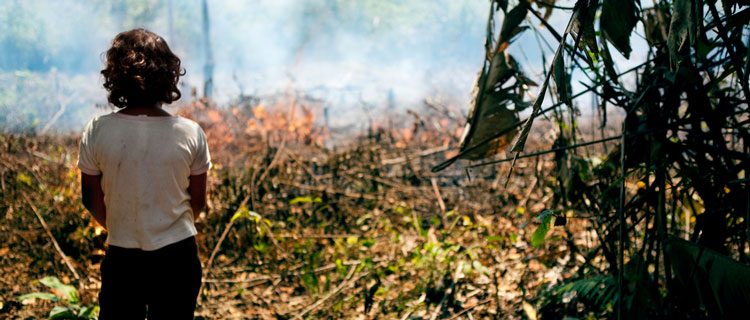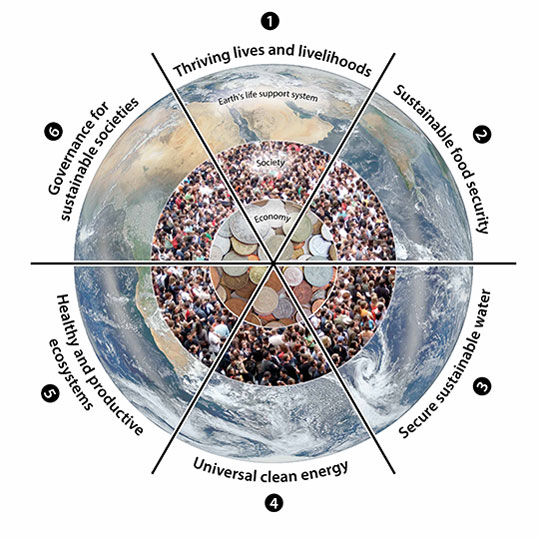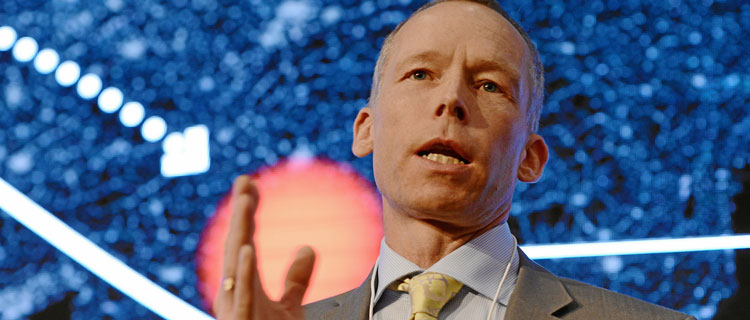
Centre director Johan Rockström explains why we must redefine sustainable development and develop Sustainable Development Goals that link poverty eradication to the protection of Earth's life support.
Sustainable Development Goals
Redefining sustainable development
Ending poverty and safeguarding Earth's life support system must be twin priorities
- In the face of increasing pressure on the planet's ability to support
life, out-dated definitions of sustainable development threaten to reverse progress - A group of international scientists identify six goals that, if met, would contribute to global sustainability while helping to alleviate poverty
- The classic model of sustainable development, of three integrated
pillars — economic, social and environmental — that has served nations and the UN for over a decade, is flawed and does not reflect reality.
Following up from recent UN meetings on the definition of the Sustainable Development Goals (SDGs), a group of international scientists have published a call in Nature, arguing for a set of six SDGs that link poverty eradication to protection of Earth's life support.
They argue that in the face of increasing pressure on the planet's ability to support life, out-dated definitions of sustainable development threaten to reverse progress made in developing countries over the last decades.
"Ending poverty and safeguarding Earth's life support system must be the twin priorities for the Sustainable Development Goals," says Johan Rockström, centre director and a co-author of the Nature article.
Together with the international team he identified six goals that, if met, would contribute to global sustainability while helping to alleviate poverty.
A serving economy within Earth's boundaries
"Climate change and other global environmental threats will increasingly become serious barriers to further human development," says lead author Professor David Griggs from Monash University in Australia. Humans are transforming Earth's life support system — the atmosphere, oceans, waterways, forests, ice sheets and biodiversity that allow us to thrive and prosper — in ways "likely to undermine development gains", he adds.
The team asserts that the classic model of sustainable development, of three integrated pillars — economic, social and environmental — that has served nations and the UN for over a decade, is flawed and does not reflect reality.
“As the global population increases towards eight billion people sustainable development should be seen as an economy serving society within Earth's life support system, not as three pillars"
Dr. Priya Shyamsundar, South Asian Network for Development and Environmental Economics, Nepal
The six goals
The new set of goals — thriving lives and livelihoods, food security, water security, clean energy, healthy and productive ecosystems, and governance for sustainable societies — aim to resolve this conflict. The targets beneath each goal include updates and expanded targets under the MDGs, including ending poverty and hunger, combating HIV/aids, and improving maternal and child health.
But also a set of planetary "must haves": climate stability, reducing biodiversity loss, protection of ecosystem services, a healthy water cycle and oceans, sustainable nitrogen and phosphorus use, clean air and sustainable material use.
Co-author Dr. Mark Stafford Smith, science director of CSIRO's climate adaptation research programme in Australia says:
"The key point is that the SDGs must genuinely add up to sustainability. The SDGs have the potential to lock in the spectacular gains on human development that we have achieved in the past two decades and help the global transition to a sustainable lifestyle. But the link between these two aims must be more coherent".

A new model for sustainable development: the illustration explains the six goals that, if met, would contribute to global sustainability while helping to alleviate poverty. Download illustration (credit: Sustainable Development Goals for people and planet, Nature, Griggs et al (2013))
Related content
The new research is linked to Future Earth, a new international research programme designed to "develop the knowledge required for societies worldwide to face challenges posed by global environmental change and to identify opportunities for a transition to global sustainability."
Phone: +468 16 2000
Organisation number: 202100-3062
VAT No: SE202100306201







